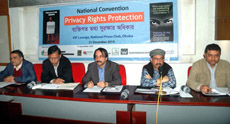 [Dhaka, 31 December 2014] Speakers in the national convention on ‘Privacy Rights Protection’ called the government to enact data protection law to secure privacy rights and personal data. The convention was organized by rights based organizations VOICE and Privacy International, in association with Bangladesh Manobadhikar Sangbadik Forum, Equity and Justice Working Group, Susashoner Jonno Procharavijan-SUPRO (Campaign for Good Governance), Online Knowledge Society, Campaign on Citizens Rights to Information at the National Press Club, Dhaka.
[Dhaka, 31 December 2014] Speakers in the national convention on ‘Privacy Rights Protection’ called the government to enact data protection law to secure privacy rights and personal data. The convention was organized by rights based organizations VOICE and Privacy International, in association with Bangladesh Manobadhikar Sangbadik Forum, Equity and Justice Working Group, Susashoner Jonno Procharavijan-SUPRO (Campaign for Good Governance), Online Knowledge Society, Campaign on Citizens Rights to Information at the National Press Club, Dhaka.
The convention proposed a draft “Data Protection Law”. The summary of the draft law has been presented by Ahmed Swapan Mahmud, executive director of VOICE while Advocate Tanzim Islam and a law department teacher of Eastern university Saimum Reza Piash highlighted some points of the draft and called for enacting to ensure citizens’ right to privacy..
The speakers said a fresh law has to be enacted to defend privacy rights, assured by article 43 of Bangladesh constitution. They mentioned that before making the law, the definition of personal information should be made more specific considering the national context and spirit. Protecting individual’s personal information has become more crucial than ever before. Privacy is essential for enabling individuals to express themselves freely. But the existing legal framework does not fully recognize the right to privacy and data protection. They emphasized on the critical awareness of the mass people regarding this issue.
Rustam Ali Foraji, MP, and also the Member of the Parliamentary Standing Committee for Special Rights, told that privacy rights must be protected while government can take appropriate measure to enact a law. However, he also mentioned that right to privacy can be subject to restrictions or limitations under certain exceptional circumstances such as State surveillance measures for the purposes of administration of criminal justice, prevention of crime or combating terrorism. Such interference is permissible only if the criteria for permissible limitations under international human rights law are met, he added.
Barrister Jyotirmoy Barua criticized interception by the agencies that was imposed through an amendment brought in 2006. He told that interception confronts privacy rights and hence violates human rights. He added that State and private agencies should have a legal limit of seeking information from individuals and they must be held accountable. Since communication surveillance, such as mobile and email interceptions, violate right to privacy, he urged government to withdraw or limit the intelligence agencies’ authority over the personal communication of individuals. He urged to the policy makers to maintain 13 International Principles on the Application of Human Rights to Communication Surveillance that include legality, adequacy, competent judicial authority, user notification, transparency, safeguard and public oversight.
Rezaul Karim Chowdhury, Chief Moderator of EquityBD states according to Right to information Act, everyone has the right to get information about the all the aspects of the state agencies and organizations only other than the issues that have concerns related to national security or public interest; but no one has the right to intervene one’s personal information unless he or she willingly discloses them. He termed freedom of expression as the ‘Right to express oneself in accordance with his/her own choice and option’ adding, “Everyone should have the freedom to opt whether or not to make personal information public.”
Mahmudur Rahman Manna, Convener, Nagarik Oikko, expresses his vigilant views concerning privacy rights prevailing in Bangladesh. He told that there must have a clear demarcation line between privacy rights and right to information so that the laws do not overlap and create bewilderment while dealing the issues. He also emphasized on the necessity of a nationwide campaign for awareness of the citizens so that the process can be more participatory. “Both security and privacy can adequately and simultaneously be ensured if we can determine them evidently” he added.
Senior journalist Saleem Samad told that surveillance hinders freedom of expression and it is contradictory to the constitutional obligation. Refering to his own story of being victim of surveillance, he urged to ensure right to privacy of individuals drawing references of victims vulnerable conditions at the society.
Ahmed Swapan Mahmud, while moderating the convention, said that privacy rights and right to information never confront. No one including public and private organizations and agencies, should have the right to any interception and surveillance of email, messaging, telephony involving recording the conversations of clients’ messages until it appears as crucial for national security. He urged to enact privacy and data protection law mentioning that privacy is needed to ensure security while it is necessary to build a progressive democratic nation.
Among others, Saleem Samad, senior journalist, Khairuzzaman Kamal of BMSF, Bangladesh Manobadhikar Journalist Forum, Kawsaruddin, president of BIJF also spoke on the occasion.
Please Download [English Press]









